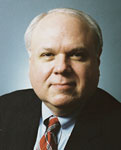On Wednesday, Politico reported that Camp (R-MI) plans to mark-up a tax reform bill in October and tie it to an increase in the debt limit.
Simultaneously, it was reported that Camp is considering a run for the U.S. Senate next year to replace the retiring Senator Carl Levin.
These two stories tell a lot about the future of tax reform in Washington, and it’s not encouraging news. For one thing, Camp may be caught up in a hard fought campaign next year to win Levin’s seat and won’t have a lot of extra time to tend to the heavy lifting of writing the first major tax reforms since 1986. Baucus has announced he is retiring from the Senate at the end of next year so that he can focus all of his attention on tax reform.
Moreover, unless he can get a waiver to a House Republican Conference rule limiting chairmen to three consecutive terms in office, Camp will be on his way out while others will clawing to win his chairmanship –and probably would prefer that Camp does as little as possible before checking out.
A waiver is unlikely because the Ways and Means Committee is, arguably, the most powerful committee in Congress, owing to the constitutional requirement that all revenue bills must originate in the House of Representatives; and Ways and Means has sole control of tax bills in the House.
Thus, there is strong interest in the chairmanship by those next in line. According to the committee web site, the next three GOP members of Ways and Means in seniority after Camp are Sam Johnson of Texas, Kevin Brady of Texas, and Paul Ryan of Wisconsin.

If seniority were the sole criteria, then Mr. Johnson would chair Ways and Means in the 114th Congress beginning in 2015. However, Republicans have often disregarded seniority since gaining control of the House after the 1994 elections. Technically, chairmen are chosen by a vote of the House Republican Conference and it often chooses to elevate its “rising stars.”
One beneficiary of this policy was Mr. Ryan, who was elevated over many senior members of the Budget Committee in the 110th Congress in 2009 to become its ranking Republican. He became chairman in the 112th Congress.
Although term-limited at the end of the 112th Congress, having had his three terms as chairman or ranking member, Ryan received a waiver allowing him a fourth term in that position that he is now serving.
While it is possible that Ryan could ask for another waiver to remain chairman of the Budget Committee in the 114th Congress, it is unlikely that he will do so. Instead, it is almost certain that he will press instead to become chairman of Ways and Means. Indeed, committee sources tell me he has already been “measuring the drapes” at Ways and Means.
Messrs. Johnson and Brady are unlikely to give in without a fight, however. Brady in particular is known to covet the chairmanship of Ways and Means and has often used his position as chairman of the Joint Economic Committee to hold hearings on tax reform. In fact, he held a hearing on that subject on Wednesday.
From what I can tell, there is very little daylight between Brady and Ryan and Camp on tax reform. All favor broadening the tax base to lower both the corporate and individual income tax rate to 25 percent at most.
Mr. Johnson has chaired the Social Security Subcommittee on Ways and Means and is not known as a player on tax reform. Therefore, I think it is unlikely that he will be the next chairman or ranking member on the full committee.
Although Republicans often talk about tax reform as if it is no big deal to abolish deductions, exclusions and credits sufficiently to slash tax rates, in fact it is a Herculean task. Just this week, Congress’s Joint Committee on Taxation estimated that lowering the top individual income tax rate to 25 percent will reduce federal revenues by $3.8 trillion over 10 years. Additionally, lowering the corporate tax rate to 25 percent will reduce revenues by $1.3 trillion.
Although it is theoretically possible to eliminate enough tax expenditures in a revenue-neutral manner, as Republicans have promised, it will be impossible to do so without going after sacred cows such as the exclusion for employer-provided health insurance, the mortgage interest deduction, the deduction for state and local taxes, and the charitable contributions deduction, among others.
Not only is this impossible to imagine, politically, it is, I think, mathematically impossible to do all this and maintain the existing progressivity of the tax code, which Republicans have also said they will do.
Sometime before October, Mr. Camp must produce an actual tax reform bill for the committee to mark-up. At present no comprehensive legislation exists even in draft form for public examination, except for a few bits and pieces. Therefore, we have nothing to analyze or any idea how he plans to slash rates without reducing net federal revenues or benefiting the wealthy at the expense of everyone else.
Consequently, the idea that there will be a tax reform bill for the House to consider by the time it must raise the debt limit is ludicrous. In fact, the Treasury says the debt limit will have to be raised in September if the government is to have the cash to pay the expenses Congress has already incurred. Moreover, the House will only be in session for 9 days in September and must finish all its appropriations bills in that limited time.
Personally, I think Mr. Camp knows full well that he can’t do tax reform this year or next. He just wants a bill for Congress to consider so that there will be many opportunities to meet with lobbyists about their objections to one provision or another. This will help him raise campaign contributions for his very expensive Senate race.
Another complication is that neither Brady nor Ryan has much interest in helping Camp move a tax reform bill. They would both like to do that themselves when they are chairman. Although I doubt they would intentionally sabotage Mr. Camp’s efforts, neither will they do much to help.
At this point, I would bet on Mr. Ryan being the next chairman of Ways and Means. More than likely, Republicans will keep control of the House in the 2014 elections and he is the most popular Republican leader in the country, according to a new Pew poll.
The bottom line is that I don’t think tax reform is going anywhere in the House this year or next.



